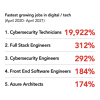
Major Skills Gap within Tech after Pandemic
The skills gap within tech is the responsibility of businesses, who must up-skill current staff according to a report by labour market experts.
Emsi and the City & Guilds Group says in its first Skills Index Report that updating the expertise of current staff will be necessary, to reflect the huge shift in ways of working caused by coronavirus.
It surveyed 2,000 working age people in the UK and 1,000 Chamber of Commerce members, to understand how prepared the workforce is for the future economy and also how ready businesses are to up-skill their current workforce.
With many firms suddenly moving online, comes increased security demands; this has seen the phenomenal rise in the need for Cybersecurity Technicians, a role that grew by 19,922%.
The skills index also found the number of job postings for digital and tech occupations in general, had a 21% increase from April 2020 to April 2021, with the highest demand for Full Stack Engineers, Cybersecurity Engineers and front-end software engineers.
According to the report: “The data suggests that while technological innovation may be making some jobs and skills obsolete, it is creating new ones.”
Kirstie Donnelly MBE, City & Guilds Group CEO said: “As demands change, we must enable people to understand which skills are likely to be in demand throughout their lifetimes and to access the training they need to stay relevant in the marketplace.”
The index cites the most important skills needed in tech are Python coders, or working within Amazon or Microsoft web services.
When asked whether they had advanced digital skills, only 9% of the workforce said they did, while 22% said they wanted to increase their competency in this area.
Meanwhile only 24% of people surveyed were confident they had the technical skills related to their current roles, while 53% said they needed industry or job-specific skills. Similarly, 53% of businesses felt they needed a workforce with more industry or job-specific skills in the coming years of hiring.
Managing Director of UK Emsi, Andy Durman said: “The future is skills. It is time for us to rethink, reimagine and rebuild the labour market upon them.”
Only 54% of employers said they were confident they would be able to recruit the skilled individuals needed in the coming years, while 20% say they would re-skill or move staff from other departments to overcome the shortage.
When asked how they currently assess future skills and talent requirements, 40% of businesses said they did this with internal audits and dialogue with staff, while only 17% said they consulted their HR departments.
In order to overcome this, the report suggested more employer-funded training and better support for individuals to fund their own training.
The report also strongly argued for the government to create better support for people who want to retrain, citing the current offer as “restrictive”. It says people who are made redundant must be helped to improve their expertise, especially in industries where those new skills are needed.








